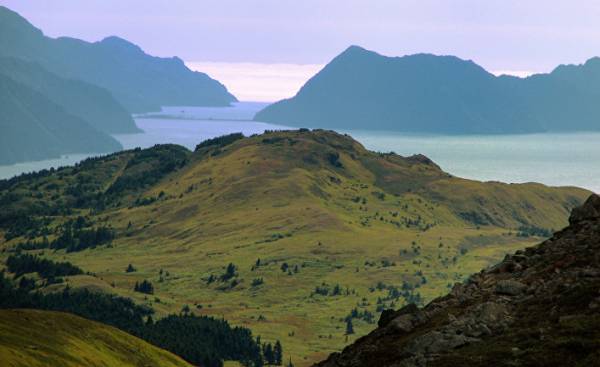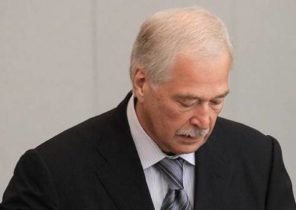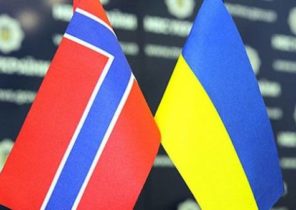
The leitmotif of Vladimir Putin’s presidency was the restoration of Russia’s greatness. His demonstration of military power and liberatoscioli is one of the reasons why Russian-American relations were at the worst level since the cold war.
So the 150th anniversary of Russia’s sale of Alaska to the United States March 30 — the event is not too noticeable for the Americans — became a day of mourning for some Russian ultra-nationalists who see in the transaction a terrible mistake to fade the tsarist Empire, is still continuous, while the big powers are fighting for power over the Arctic and its rich natural resources in the age of climate change.
“If Russia owned today by the Arctic, the world would be a different geopolitical situation,” — said the head of the Crimea Sergey Aksenov in an interview with the Crimean channel.
Niche military the edition “Military-industrial courier” recently published an article in two parts entitled “Alaska, we lost” with grim thoughts about how things could be, had events unfolded differently.
Even the Minister of foreign Affairs of Russia Sergey Lavrov, asked about Alaska in a recent interview in a Russian newspaper. “The upcoming anniversary can, of course, cause different emotions. However, it is a good occasion to remember the contribution that Russians made in the exploration of the American continent,” he said.
Putin asked for Alaska, given during the direct line with the President, said, “Let’s not get excited”. At the international Arctic forum in Arkhangelsk on Thursday, March 30, he stressed that America’s actions in Alaska could destabilize the world order. “What we do locally is limited, and the fact that the US is doing in Alaska is happening at a global level,” he said, calling U.S. development of a missile system there, “one of the most acute security problems”.
Of course, no one seriously suggests that Russia will return to Alaska just as it annexed Crimea in 2014. But the differences between the way a sale to remember in Russia and in the United States — and most importantly, in the community of the indigenous population of Alaska, indicate that the history of the state is understood as an intersection of culture and religion.
Russian began to settle in Alaska in 1784, furnished there trading places and Orthodox churches, mainly along the coast. By 1860, losing in the Crimean war Britain and fearing that she’ll take the AK in the case of the emergence of a new conflict, the king decided to make a deal.
Sea otters, fur which at that time was the Foundation of the fur industry, almost all were destroyed, and the Russians also feared that if Alaska is found the gold (but it was found during Londonskoy gold rush in 1896), the Americans flood the area, says Susan Smith-Peter (Susan Smith-Peter), historian of the College of Staten island in new York.
“From the Russian point of view, the deal was very favorable, she says. — They would have irritated Britain and achieved a rapprochement with the United States.”
The US is also expected that the deal will be in closer to China to conduct trade with him, and will reflect any claim of Britain on the West coast, says Gwen Miller (Gwenn A. Miller), historian of the College of the Holy cross in Worcester, Massachusetts.
“It really was meant to be,” she says, ” so there was the expansion of the territory of the United States.”
The terms of the contract — which was set the price of 7.2 million dollars, or about 125 million modern dollars, was negotiated and signed by Eduard von Stecklum, the Russian Ambassador to the U.S., and William H. Seward (William H. Seward), American Secretary of state. The agreement for the most part was considered mutually beneficial, but some critics ridiculed him, calling “Seward Folly” or “Seward’s Freezer”, and even today, scientists continue to argue about the benefits of this transaction.
In some Russian circles, the sale of Alaska has left a bitter aftertaste. “And Alaska has sold its Russian people” — wrote in the autumn of last year Vladimir Kolychev, an Amateur historian in a poem addressed to Tsar Alexander II.
Andrei Znamensky, Professor of history at the University of Memphis, says that irredentist demands for the return of Alaska is not limited to extremists.
“This is a very convenient episode exploited by nationalists, who want the expansion of Russia, — he said. — It matches the public rhetoric: look at the cost of us Americans.”
In abundance also the theory that Russia was a victim of deception, and gold, which paid for the deal, sank with the ship or fell into the hands of robbers. Scientist Alexander Petrov of Moscow state University named after M. V. Lomonosov disproved these theories, finding a document proving that almost anything received from the sale of the money went to the construction of Railways.
In Washington in honor of the anniversary was to be organized lunch in a National press club reception at the state Department, and concert music composer John Luther Adams (John Luther Adams), who spent most of his life in Alaska. On Alaska talks, lectures, exhibitions and other events will continue until the Day of Alaska on October 18, is the date of the formal transfer of this US territory. Alaska became the 49th U.S. state in January 1959.
Lieutenant Governor Byron Mallott (Byron Mallott), representative of the Tlingit, group of native population of the North-West Pacific coast, calls the event “a memorable event and not a celebration.”
“We look at these 150 years, very soberly,” — said in a telephone interview, Mr. Mallott. “And at the mercy of Russia, and the U.S. government from the native population of Alaska was quite a serious problem. But we also are well aware that we live in the greatest democracy on earth, despite recent events, what can be said about the other side.”
When the Russians arrived in Alaska, they used the people living near the coast to hunt sea otters. After the sale of the lands of indigenous people were released, but the Americans have brought new challenges, says Sergei Kan, Professor and specialist in the study of native Americans at Dartmouth College in new Hampshire.
“The era of Russian possession was tied to paternalistic control, but Russia did not aim to radically change the life, it exploited the people for their economic benefits, says Mr. Kang. With the advent of the Americans began a more violent Westernization”.
Hal Spackman (Spackman Hal), the Executive Director of the Historical Museum Sitka, Alaska, said that Russian heritage is still visible in the names of people, geographical names and preserved in Orthodoxy.
63-year-old Bob Sam Bob (Sam) was born and raised in Sitka, the city became the first capital of Alaska. He said that not all residents of the area were pleased with this anniversary.
“But 150 years later,” he says, ” it’s time to heal, time to find something in common to the local population of Alaska continued to be the people they had become.”
Talking about the sale of Alaska has appeared on the sidelines of the forum in Arkhangelsk.
Paul Fuchs (Paul Fuhs), governing a private organization Marine Exchange of Alaska, which regulates shipping in the Bering Strait, said that his Russian interlocutors occasionally for a drink mourned the sale of Alaska.
“They think it was stupid to sell it for $ 7.2 million, he said at the forum. But this does not mean that they were coming back from the army to take her back.”
Craig Flinner (Craig Fleener), senior Advisor in the government of Alaska on Arctic issues, became the target of close attention from the Russian side in the forum, especially when talking about the blocking of “colonial thinking”, that is, preventing attempts by the Federal government or other institutions engaged in the North, the extraction of natural resources from which local residents will receive almost no benefit.
“Americans are experiencing the same problems that we do,” was surprised with a party after the speech of Mr. Pliner.







